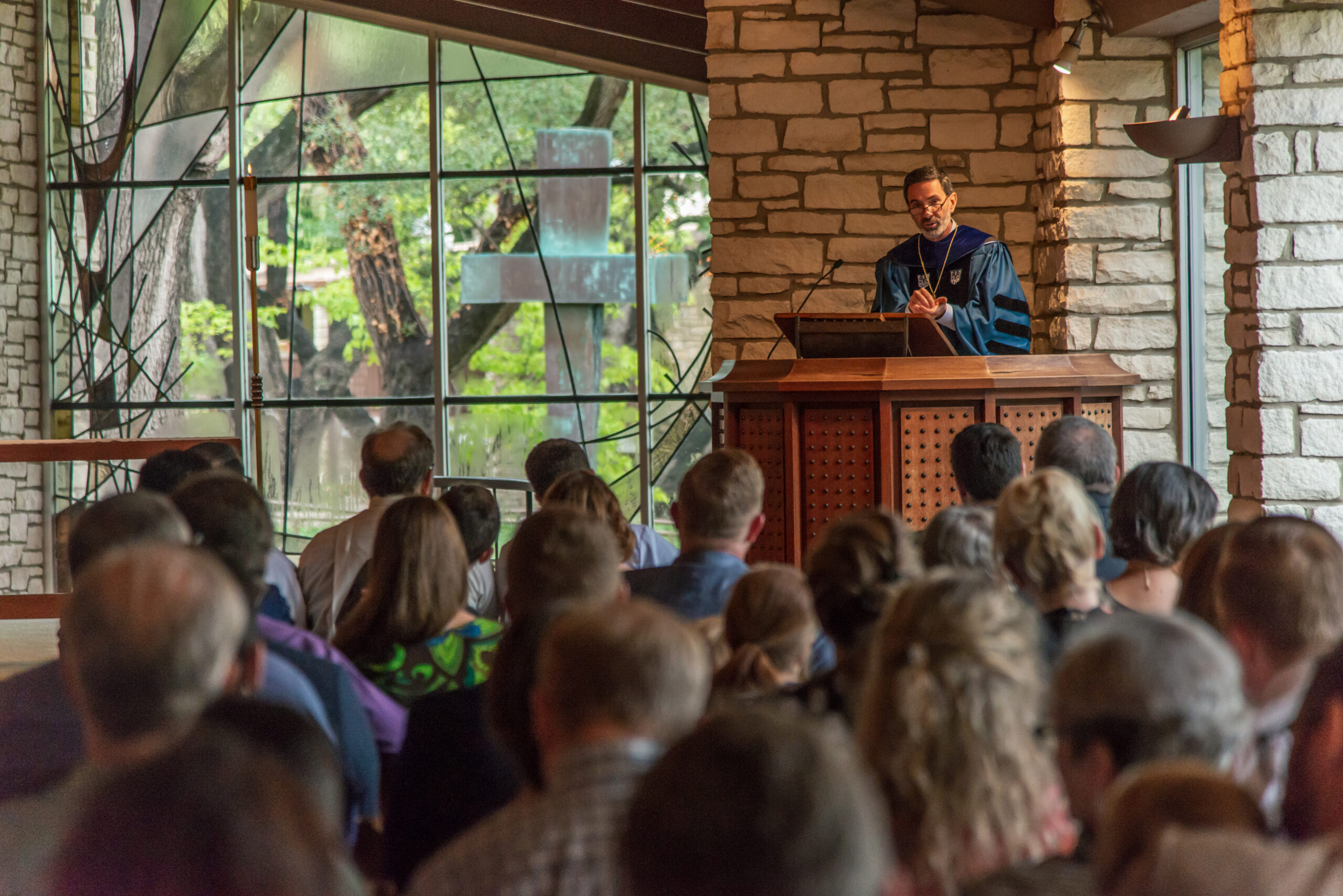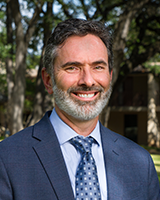Sowing Holy Questions begins the Fall semester with excerpts from the sermon delivered by Dr. Scott Bader-Saye, academic dean, during Southwest’s annual Matriculation Evensong, where new students and faculty are welcomed into our community.
When I was in fifth grade, I had a teacher I wanted to impress. She was smart and engaging and, frankly, I had a little bit of a crush on her. But I remember a particular school day in which I was apparently not behaving well. I can’t remember the nature of my bad behavior. I only remember the teacher’s stern voice asking, “Scott, do you want to teach this class?” “Yes, I do,” was my answer.
Perhaps my words were a prophetic anticipation of my future profession, but at the moment there was no way to sell that positive spin.
She told me to go stand in the hall, and after I had fearfully waited for what seemed like an eternity, she came outside and scolded me for my disruption and my rudeness. She made clear who was in charge of the classroom. She put me in my place.
I would like to think that the rest of my unfolding adulthood proved my fifth grade self to be in the right, but what I remember from that day is not that I began my path toward being an educator. Rather, I remember learning that this is what education looks like – a teacher who authoritatively asserts their power to rule the classroom and students whose role is to stay quiet and receive the learning that is laid upon them.
My moment of conflict with this teacher was a small matter in the grand scheme of my education, but we might see it as a lens onto a bigger problem – a model of education built on authority, compliance, and judgment.
In our reading this evening, Jesus shows us a different way to think about teaching and learning.
Jesus says, “I thank you, Father, Lord of heaven and earth because you have hidden these things from the wise and the intelligent and have revealed them to infants.”
I have to confess that I am a little troubled by these words. They hit a little close to home. As an educator I’m a big fan of wisdom and intelligence. Why is Jesus calling this into question? And, as a side note, why would this passage even be suggested by the lectionary as an appropriate reading under the designation “for education.” To my ear it sounds like this passage is “against education.”
But if we read closely we see that Jesus is not saying that learning is bad or that wisdom is useless and unimportant. Jesus is not extolling a know-nothing platform. Rather, he is inviting us into a way of receiving and holding wisdom that is different from the scholars of his day.
What makes the “infants” different from the “wise and intelligent” is that wisdom is “revealed” to them rather than being forced upon them or possessed by them. Learning as revelation involves a posture of receptivity, a willingness to pay close attention to what a text, a tree, a practice, a lecture, a setting sun might open up for us. Revelation, which is the pulling back of a curtain, only happens when someone is paying enough attention to notice the curtain’s movement.
Jewish philosopher Peter Ochs describes a revelatory way of seeing things-before-us as creatures born of God’s speaking; he says, “One might regard any thing in the world as a hidden face of its Creator: this dog is not just this dog, but God ’s voice still speaking ‘dog’” (“Morning Prayer as Redemptive Thinking”). To experience the things around us as carrying this capacity for revelation requires that we listen closely for the still small voice of the Spirit.
The goal of education is to help us develop attentiveness to the places where revealing happens and to introduce us to the revealed wisdom of those who have gone before us. This vision of education is not about how “smart” you are. It is about practices of attention, receptivity, and openness.
These practices become habits and dispositions as we take on what Jesus describes as his “easy yoke.”
Come to me, all you that are weary and are carrying heavy burdens, and I will give you rest. Take my yoke upon you, and learn from me; for I am gentle and humble in heart, and you will find rest for your souls. For my yoke is easy, and my burden is light.
In these words, Jesus contrasts two approaches to teaching and learning. I will call them the pedagogy of the “heavy burden” and the pedagogy of the “easy yoke.”
An example of the pedagogy of the heavy burden can be seen later in Matthew when Jesus challenges some of the scribes and Pharisees of his day who teach the traditions of Moses.
He says,
The scribes and the Pharisees sit on Moses’ seat; therefore, do whatever they teach you and follow it; but do not do as they do, for they do not practice what they teach. They tie up heavy burdens hard to bear, and lay them on the shoulders of others; but they themselves are unwilling to lift a finger to move them. (Matt 23:2-4)
The problem is not what is taught – they are teaching the traditions of Moses. The problem is with the way it is taught – through the pedagogy of the heavy burden. This approach is based on proving yourself capable of carrying the weight and weeding out those can’t.
Jesus’ pedagogy of the easy yoke, to be sure, does not suggest that learning requires no effort. A yoke is a harness for pulling a cart or a plow. Taking a yoke suggests work is to be done – there will be pulling. But the yoke is easy, it fits well, it serves as a tool to lighten the burden. An education of the easy yoke gives students tools for learning that allow their pulling to be fruitful rather than a burden.
The faculty you will learn from in this place bring their wisdom, experience, skill, and knowledge into the classroom not to lay heavy burdens on you or to ask you to prove yourselves; but rather,
- to help you attend closely to where the revealing of wisdom can happen,
- to offer practices, ideas, research, theories, and texts that are worthy of your attention,
- and to help you develop the dispositions of openness, receptivity, and empathy necessary to notice when the curtain is being pulled back.
We are excited to welcome you, our new students, into this good work.




5 Responses
What a beautiful way to humanize the concept of “wisdom” with equanimity and freshness. Wisdom often is appropriated by the elite, the “degreed”, perhaps the isolated academic. What you’ve emphasized in Jesus’ teaching is the accessibility of wisdom for all who are open to receiving it. Thank you for helping us to remember what we do here as students is “good work” that is enriching our journey toward being more compassionate and receptive to a plethora of people, situations and ideas.
Excellent read Scott. Thank you. Hope all is well.
I am so grateful to the seminary, and you, Scott, for “practicing what you preach.” Pun intended. I am so grateful too you and all the faculty at SSW for my rich experience of formation.
To. 😂
Oh that my granddaughters’ teachers would follow these ideas. Our sophomore in college and our sophomore in high school tell me some stories about teachers whose “rote” philosophy guides their teaching.